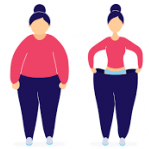Search the Community
Showing results for 'three week stall'.
Found 17,501 results
-


Literally crying right now
Arabesque replied to SleeveToBypass2023's topic in POST-Operation Weight Loss Surgery Q&A
As @SleeverSk said your nerves are still healing after being cut during the surgery & you won’t feel signals yet which is why it’s important to stick to the portion sizes you’re given & your eating plan. All because you can doesn’t mean you should. The staged return to eating is there for a reason - to support & protect your healing tummy. Remember all those staples & sutures holding your tummy together. Yes, we all recover & heal at our own pace but you can’t see your tummy to assess how you are healing. Stick to your plan & eat slowly is always safest. Testing a food a couple of days before your plan says to is ok. Trying something a solid food like a chicken thigh three weeks before your plan likely recommends isn’t the best choice. -


Insight/thoughts for someone considering sleeve surgery
LookingForward22 replied to Veebear's topic in Gastric Sleeve Surgery Forums
I’m a little further down the path than you but I haven’t had my surgery yet, but I did want to share one thing I learned so far. Listen to your instincts and find a program that you feel comfortable with. Don’t be afraid to stop the process at any point if that is what your instincts are telling you. Back at the end of 2021 I went with a local surgical program I’m familiar with and I had good recommendations for. My husband went to the initial appointment with the dr and we asked our questions. We left not feeling confident about the surgeon or the program but I chalked it up to nerves. Along the way I had more appointments - some went great … some made me feel uneasy with the program, like they were just pushing me through and not addressing my concerns. I met all my requirements, went through the required steps and I had surgery scheduled for early Feb. I was just two weeks from my surgical date and I canceled. Before I canceled I talked my concerns through with my husband, PCP, endocrinologist and the facilities practice manager. It just wasn’t the right fit for me. Since then I looked into other area programs, debating if I really should go forward with surgery. This month I found another I think will be a better fit for me. I just started the process but if all goes well I expect to be scheduled this summer - hopefully July or early August. It’s a little frustrating to be starting over again, but I’m much more at ease knowing this program is a better fit and I have been reassured that if I’m not ready at three months (my expected approval plan) they will work with me to make sure that I feel comfortable and confident with the process to have the very best out come for me. If I decide to not have surgery they will refer me to the medically supervised weight loss program as a plan B, if I decide surgery isn’t the right choice at any point. Although the idea of surgery still scares me somewhat, I feel much more comfortable this time around knowing I have support both outside the program and within - which is more likely to help me be successful. Best of luck in your journey, no matter what you decide to do. -


Baseball size bulge where port was after removal
Band Remover 2022 replied to lisamariec's topic in LAP-BAND Surgery Forums
Hi Parisshel, it was very painful, scary and I'm just happy it's over and the band is gone and I'm still alive. The way he explained it is that when the lapband first came out, they made two different versions of it. One was made with hooks, where you can turn it easily to put it in and the theory was, if it had not slipped nor eroded, it would be just as easy to take it out. He said I did have the one with these "hooks" -- and I'm not quoting him on WHY it wound up having to be dug out - but I'm assuming because of the slippage that happened. Also, another possible contribution to this issue could be that I was not having it filled consistently because I felt it was already too restrictive and people were commenting on that I was losing too much weight. (I think some might have even questioned if I was "sick" with something). I filled it a few time in the 10 years I had it and towards the end had it loosened/filling taken out and then eventually, unfilled completely in Nov 2021--- and maybe that's when it really started to slip and all that happened to wind me up having it completely removed. My suggestion to anyone that has one -- is, even if you are not going in to get a fill - at least still visit with your doctor and drink the barium so they can check in on the band - ask about slippage, erosion, etc. At the beginning of the big "lap band surge" before they knew a lot of long term reactions --- the doctors and surgeons would say it is "VERY RARE" that it will slip or erode. Now, they are finding out -- it is MORE common than NOT for it to erode and/or slip. So, have it checked - mine was supposed to be checked every three months. But, because I wasn't interested in having it filled, I would not follow those standards. I had a very very reputable doctor too, so, it really was my fault for not having him check in on it time to time, regardless of fills. To address your last part, I am feeling a lot better, thank you! it has been two weeks and 2 days since the removal. I would say I was only "ok" after about a full week. I still have incision tape that needs to fall off, but all in all, worth it knowing now that it's out! I have to say, I have not gained any weight since the removal and do not see myself eating any more than I did with it in (but again, remember I wasn't filling it, and he it completely unfilled last November). Looking back, I think the one benefit I did gain from it - it gave a "kick start" on my weight loss but also forced me to realize and change my eating habits. !! Good luck with everything! -


Vasovagal Syncope (Fainting) post gastric sleeve
Vassarini replied to GlA's topic in POST-Operation Weight Loss Surgery Q&A
I have had three vasovagal syncope incidents since my GBS, but all were related to needing IVs inserted for medical procedures (cataract removal and gallbladder removal). I’m a breast cancer survivor though and had this — again related to blood draws / IVs — while undergoing treatment many years ago, well before my GBS. So I am predisposed to this reaction for IVs, and my doctors (since several were involved) think the fasting (including liquids) probably contributed to my predisposition. I have low blood pressure generally. The first incident occurred during my first cataract surgery prep, where I did pass out. Following that, I alerted the following two anesthesiologists, and they put me in the head-down, feet-up posture, which helped. I’ll have to check iron levels to see if that may be affecting my reactions. -


Social eating after gastric sleeve
FutureSylph replied to TriStateSleever's topic in Gastric Sleeve Surgery Forums
It's not obvious to me. Almost three months post-op, and my fairly robust social life hasn't been affected at all, except that many people have commented that I look terrific. -


Kinda annoyed and confused
Arabesque replied to SleeveToBypass2023's topic in POST-Operation Weight Loss Surgery Q&A
I found keeping an eating schedule much easier too. I still follow one though with a little flexibility based upon how I’m feeling (hungry/not hungry) & what I’m doing. Generally, at three years, I do breakfast at 8:30, snack at 12, lunch at 3:30, dinner at 6 & snack at 7:30. Sometimes there’s an extra snack before lunch but then lunch & dinner are later. Initially I started because I wasn’t hungry or interested in eating after surgery. Then when I was trying to stabilise my weight, it helped to ensure I got in the calories I needed to stop losing & now it’s to meet my higher protein goals. (It’s why I snack so often too.) Give it a go. You may find it helpful too -


Lots of complications after bypass..... anyone else???
Sunnyway replied to Lem32's topic in POST-Operation Weight Loss Surgery Q&A
I had RNY to RNY revision surgery on 12/21/21. I thought I was fine, slowly recovering, until 10 days later when I started coughing up blood. I was airlifted back to the surgical hospital with a perforated jejunum at the anastomosis and SEPSIS. I had emergency surgery and was close to death for several days. I was in the hospital for 7 weeks and in a rehab facility for 3 weeks. I was discharged with a 15 cm long open surgical wound which is still not entirely healed 3 months later (but getting close). I resumed normal activities after returning home and have no pain from the open surgical wound. I have volunteer nurses who come to my home to do dressing changes, now every other day. Because of three necessary endoscopic procedures looking for leaks or abscesses my anastomosis is stretched and I have no more restriction than I had before the revision surgery. I had lost 70 lbs prior to surgery by cutting out all sugar, flour, rice, white potatoes, processed food. I've lost 25 more since the revision. I've been told to get 90 mg protein daily and to limit my calories to 800--which is VERY difficult. To add insult to injury I'm starting to lose my hair, too. I'm really struggling with cravings in the afternoon and night. We are now considering a prescription for CONTRAVE. Do I have regrets for having the revision surgery? Of course! I wish I had left it alone. I wish my surgeon had aborted the revision when he found I had dense adhesions. However, I'm well now and am approaching a 100 lb weight loss. -


What Is the best body scale to purchase?
vikingbeast replied to Lsoto81's topic in POST-Operation Weight Loss Surgery Q&A
I doubt it. It's using electrical signals from your legs and can't accurately predict your trunk, so just 3% off is pretty good. I have a DEXA scan every three months and that's what I use (and, oddly, since I lost weight, the DEXA scan is within 0.5% bodyfat of the little throwaway hand-held electrical impedance thing every single gym has.) -


How long were you off work after surgery?
Arabesque replied to healthy granny's topic in Gastric Sleeve Surgery Forums
It just depends on how you recover & how your body reacts to the changes. My friends & I had desk jobs too - quite mentally demanding & reactionary. One was back after a week, another took three weeks & I needed four (I always take longer to recover from everything). Best advice is to have a contingency plan in place with your employer - ability to take more time if needed, to return part time or with reduced hours. Just don’t push yourself to do more than you physically (& mentally) are able. -


Kinda annoyed and confused
suzannethemom replied to SleeveToBypass2023's topic in POST-Operation Weight Loss Surgery Q&A
The rule of thumb for almost all bariatric patients is three meals a day with no snacking in between. This is because snacking allows you to overeat and exceed calories. We are supposed to be drinking fluids between the three meals. I have never heard of a plan that has you eat every 3 hours. Recommended serving size is 1/2 cup per meal. After six weeks, you can increase to 1 cup per meal. It should only take you 20 to 30 minutes to consume your meal. If it’s taking you an hour, then something is wrong. The food is too dense or not diluted enough or too high in fat content and causing restriction. -
If I were you and I still felt like that three weeks later I would contact them again. If nothing else they need to be aware that you are still not holding anything down. If you really are vomiting everything up, You may need supplemental nutrition.
-


Nerves and am I choosing right?
Arabesque replied to mrsjo's topic in PRE-Operation Weight Loss Surgery Q&A
Nerves are pretty common prior to surgery, so you aren’t alone in that & it is understandable. It’s a pretty major surgery & you are making changes to your body & your lifestyle. Yes malabsorption is something to continuously monitor after bypass. Regular blood tests will keep you informed of any thing you may lack & they will pick up any specific absorption issues you may have. It will be important to monitor your diet to ensure you’re consuming a range of nutrients & take the vitamin supplements you need. Yes, malabsorption isn’t really an issue with sleeve & you may not need to take vitamins in the long term (I don’t). But eating a balanced diet is always the healthier choice. Some people have posted about dental issues post surgery but not many that I can recall. Could be something that began pre surgery because of dietary choices, be a genetic weakness, or they had pre existing gerd/reflux. Excess acid is a common temporary side effect of surgery but keeping on top of it will help reduce your risk of dental damage - take your PPIs. In three years, I haven’t had an issue at all. We’re all different & we can’t predict how our bodies will react to the changes. All because something may happen, doesn’t mean it will. Not worth focussing on some very low risk maybe. Focus on what will happen: a healthier you. But, as you already have reflux, bypass is really your best option. Why did you choose or were you advised bypass over sleeve in the first place? Those reasons will still be true. All the best. -


Liver shrinking diet UK
Arabesque replied to Lou30102015's topic in PRE-Operation Weight Loss Surgery Q&A
There are a number of different pre surgical diets but you must follow the one you are given. I’ve noticed a few UK members have been on a milk diet. Three pints of milk provides 48g of protein plus a high protein yoghurt can provide 15-20g so about the usually recommended 60g of protein. The broader range of nutrients is a worry but your doctor would be aware of that. The headaches & weakness comes from cutting out carbs, sugar, caffeine - breaking the addictions & removing the stimulants (caffeine & sugar) from your diet. The first 5-7 days are usually the hardest but it gets easier. -


Kinda annoyed and confused
Sunshine Princess replied to SleeveToBypass2023's topic in POST-Operation Weight Loss Surgery Q&A
This is from my patient manual on meal spacing for the first three months z -


6 weeks out - I'm very worried - could I stretch my sleeve with this amount of food??
vikingbeast replied to bestdecisionmade's topic in Gastric Sleeve Surgery Forums
I also was able to eat more than your average sleever. But also, I suspect my surgeon made my sleeve a bit bigger knowing how active I was even before surgery (it's hard to be so active when you can't eat enough!). When I was three months out I was restricting myself to 800 calories and my center's nutritionist had an absolute conniption at me. Said I was ruining the tool and if I wanted to just gain all the weight back, that was my business. I was devastated for a hot second before I absolutely lost my temper at the top of my lungs and fired her so loud they heard it in the surgeon's office across the hall. A friend of mine recommended a nutrition program she used, and I am so glad I found it. Immediately my nutrition coach (who had coached other bariatric patients before) upped my calories to about 1200, still prioritizing protein. Over the last six months she's increased it to 1600-1800, and we're just now backing off a little bit because I feel like all I do is eat. I have just a few pounds left to lose, so they will be harder to shift. I expect maintenance will be around 1600 calories depending on activity level. -


Kinda annoyed and confused
Tufflaw replied to SleeveToBypass2023's topic in POST-Operation Weight Loss Surgery Q&A
I've never heard of eating every 3 hours, I was recommended to eat three meals with two "snacks" in between, which sometimes I do and sometimes I don't. I also track calories but for me it's always more about the portion size. I started at about 4 oz, now I do 6 or 7. I try to stay low-cal and low-carb if I can but I don't drive myself crazy about it. Typical day for me is breakfast of two scrambled eggs with 1 oz of shredded cheese (same breakfast since right after my surgery). Before eating usually an 11 oz premier protein drink - if I don't have it first I wait an hour after eating to have it. Usually no snack before lunch because of the protein shake but sometimes either an apple or 6-7 oz of cantaloupe. Lunch is usually a pre-made salad I get from Target, either the chicken caesar (360 cal) or asian fusion (270). Post-lunch snack is usually two sugar free jello puddings (chocolate/vanilla swirl). Dinner I mix up a bit but frequently it's a 4 oz piece of fish plus 3 oz corn, with 2 tbsp teriyaki sauce. Dessert is Halo Top ice cream. I drink Crystal Light sweet tea whenever I can remember to drink. That's pretty much it and it's working pretty well. -


Kinda annoyed and confused
vikingbeast replied to SleeveToBypass2023's topic in POST-Operation Weight Loss Surgery Q&A
If you can get to your protein target by eating three hours after you finish eating, go for it. -


Eating every 3 hours....
Queen ApisM replied to SleeveToBypass2023's topic in POST-Operation Weight Loss Surgery Q&A
Now, probably more like every three hours from when I started the last meal. Sometimes shorter, sometimes longer, and mostly because if I don't do this, I can't get to my 1400-1500 calorie daily goal. But, it also doesn't take me 30 min to eat 2 oz of food anymore, so that makes a big difference with regard to the math. In the beginning, it took me 30 min to eat one scrambled egg! That's not the case anymore. For example, I eat breakfast around 6:30, and then have a small snack at 9:30-10 AM, lunch between 12 and 1, another snack at around 3 or 3:30, dinner between 5 and 6, and then another snack around 8:30-9:15. I wouldn't sweat about whether you are eating 3 hours from start time or end time. I'd base it on a) what your body is telling you, and b) what you need to do to reach your goals. Early on, I was never hungry, so I had to just do what I needed to do to get in my protein. -


Eating every 3 hours....
Queen ApisM replied to SleeveToBypass2023's topic in POST-Operation Weight Loss Surgery Q&A
I still eat every three-four hours and I am basically 10ish months out. I can't get close to my calorie goals if I don't, even with increased amounts at each meal versus where I was at two or three months out. Having said that, early on as long as I was hitting my protein and fluid goals, that's what I focused on most. I don't think I was eating 6x a day - more like 4 + a shake. -


Anyone have Mast Cell Disease?
catwoman7 replied to one4sorrowtwo4joy's topic in General Weight Loss Surgery Discussions
I can only answer the question on crushed pills. No, not forever. In fact, I was able to swallow all but two of mine whole as soon as I got home from the hospital. I had to wait about three weeks before I could swallow the remaining two whole. -


Anyone have Mast Cell Disease?
one4sorrowtwo4joy posted a topic in General Weight Loss Surgery Discussions
Has anyone here had a gastric sleeve and also has Mast Cell Activation Syndrome (MCAS)? I just need to know that someone else safely had it done and didn't have a major multi-systemic reaction to the surgery or in post-op. I'm prone to anaphylaxis but I've had other surgeries (knees and shoulder) since diagnosis and with my surgical team being cautious I made it through surgery without having a major reaction. I previously had a consult with a bariatric surgeon and she said she wouldn't touch me; that it was too risky. But that was maybe three years ago and I'm definitely more stable now than I was then. My pain doctor wants me to get a second opinion so I'm going to meeting with a bariatric surgeon in a few weeks and also meeting with my mast cell doctor. I was just hoping that someone who it has experience with it could reassure me that it can be done safely. Concerns I have: - my diet already has to be restrictive because of the MCAS. I worry about getting enough protein in when I have to avoid tree nuts and all meat products. I can have milk (lactose free) and eggs. - I read that my meds have to be crushed or split post-surgery. Is that for forever? I have some capsules that I take that can't be crushed or broken. I also have liquid medication I take that gets diluted I'm about a cup of water. I use that water to take all of my pills, and there's a fair amount of pills. - exercise is an issue for me. I've anaphylaxed during an easy yoga class before. I've built up to be able to do seven to ten minutes on a seated elliptical or seated stepper. But I'm not going to be running any 5ks anytime soon. Is it still an effective surgery if my workout options afterwards are extremely limited because of my MCAS? - if I'm on meds that have caused weight gain for me, is it possible to still lose weight while being on the med? I can't safely go off of the meds unfortunately. I think I'm just scared to get my hopes up that this surgery could be a safe and effective tool to help me lose weight. I'm 5'4 and 400 lbs. I need help. The likelihood that my surgeon will be familiar with or educated in mast cell diseases is really low and I know that I'll have to do a lot of advocating for myself. If you've made it this far thank you for listening. Any advice would be greatly appreciated. -
Was it dumping, the foamies or just your restriction? Dumping makes you feel physically sick & you may vomit or have diarrhoea, cold sweats, heart palpitations, etc. takes time (often hours) to recover. The foamies feels like something is stuck, you produce excess salvia & you may regurgitate a thick foamy saliva & often whatever you ate that was ‘stuck’. I also sometime have a barking cough as if trying to shift the obstruction. It passes quickly. Your restriction is a heaviness or tightness across your upper chest. I find myself thumping my chest as if to relieve & open it up again. It can take longer to pass than the foamies but not hours like dumping. The first time I had the foamies was with a mushy carrot but potato sits heavily in my tummy - like groan heavy, eaten way too much heavy & after only a bite or two. Still does & I’m three years out. (Bread & pasta is the same for me.) It’s all part of how we are different. At the beginning your tummy can be sensitive & fussy. Eat something today no issue. Eat it tomorrow & your tummy is no way. But two days later all is fine again. I called mine a petulant, tantrum throwing 2 yr old.
-


Does eating still take 20 mins months down the road?
Arabesque replied to Vivis's topic in Gastric Sleeve Surgery Forums
Three years out & I take 30-60minutes to eat - probably average 40minutes for a meal. If I eat too quickly my restriction kicks in & then I’m done. I also do it because I don’t focus as much on the act of eating as I did before surgery. Still ask myself do I need the next bite or do I just want it & I often put food on my fork but then put it down again too. I still take small bites too. A lot of it is just habit now. Remember it takes time for the full message to get through & when it does you likely have eaten more than you need & are more than full. My full message can be very slow, (30mins or so after I’ve finished) which also directs my slow eating but that is me. I’m not someone who has been able to go back to skulling a lot of liquid. Two large mouthfuls at a time. A couple of minutes later I can have another mouthful. I can have a couple of sips up to 5 minutes before I eat & about the same after. But not mouthfuls as they can be too filling & wash the food out of my tummy more quickly. So I guess it really comes down to what you’re able to do & what works for you. But certainly while you are losing keep waiting to drink before & after you eat & keep eating slowly. -
Hi all - after two cancelled surgeries earlier this year, I'm now three days away from my gastric sleeve appointment! I've needed to stay away from this board whilst waiting as I was thinking 'what if...' far too much, but it's been great catching up with all the posts and seeing how supportive and helpful everyone is to each other. @Nikki@50 Hope your surgery went ok and that recovery hasn't been too tough so far? I'm a mixture of nerves and excitement; one good thing about the delay is that I feel more confident than ever in my decision to take this step. I've been doing some work with a psychologist for a few months about emotional eating and I feel stronger and more confident than I have in a long while. Look forward to continue reading about your experiences, and I'm sure I'll be asking loads of questions over the coming weeks and months xx
-


Kinda annoyed and confused
Arabesque replied to SleeveToBypass2023's topic in POST-Operation Weight Loss Surgery Q&A
Yeah, some dieticians are pretty crappy. Your’s just doesn’t seem to get this is something totally new to you & you want to get the best out of this opportunity. They are supposed yo be supporting you through this. There’s nothing wrong with wanting a greater framework & more specific guidelines to feel comfortable & confident about what you’re doing. A blanket try whatever you want is not good advice. Eating whatever you wanted got you where you were before surgery. The only thing I agree with is that there is a bit of trial & error about what foods your tummy will tolerate in these first weeks when it can be more sensitive & fussy. I was given portion size no calories, and a list of suggested foods to eat & avoid from the surgeon & the dietician. As a help I was advised 1/4 - 1/3 cup of food from puree three times a day. I could have a snack if I was able (I ate yoghurt to boost my protein most afternoons). Low fat, very low carbs, no starchy vegetables, protein, protein, protein. I didn’t care how long I took to eat. I wasn’t hungry & wasn’t interested in eating but I knew I had to. But this was my plan. Remember you won’t get the same feelings of fullness, etc. (& they likely will be different to what you used to experience) until you’re fully healed & eating solid food. Hence the importance of portion control. Congrats on yiur weight loss so far.





